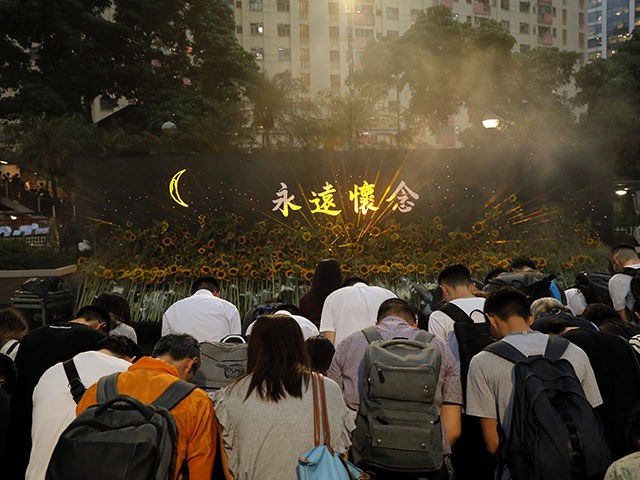Thousands of people in Hong Kong gathered on Monday to observe the anniversary of the death of Marco Leung, a protester who fell to his death on the eve of the largest protest in the city’s history.
Hong Kong marked one year since an estimated two million people took the streets last year against a proposed law that would have allowed police to extradite anyone present in the city to China if accused of violating Communist Party laws. Hong Kong’s total population is estimated to be around seven million people. The bill did not pass, but in May Beijing passed a law that effectively allows for the same treatment, as it expands the power of the Chinese police force to act within Hong Kong in cases the Communist Party deems threatening to the national security of the country.
Under the “One Country, Two Systems” policy, the Communist Party agreed to grant Hong Kong legal autonomy in exchange for Hong Kong residents not pursuing sovereignty from China. Pro-democracy activists insist both the extradition bill and the “national security” bill violate “One Country, Two Systems.”
The Hong Kong protest movement that began a year ago appeared to lose some energy at the height of the Chinese coronavirus pandemic, when authorities urged people to stay at home and minimize time exposed to others. After the government eased some restrictions, allowing gatherings of up to eight people, protesters rapidly began taking the streets again. Hong Kong residents also defied coronavirus restrictions on June 4, the anniversary of the Tiananmen Square massacre in Beijing, to hold a candlelight vigil in honor of the dead. Hong Kong has held such a vigil every year since the massacre, which claimed the lives of thousands of people, occurred.
A timelapse of the long queues which have formed on Monday night, as demonstrators pay tribute to Marco Leung. @chingrachelwong 2019 coverage: https://t.co/PnynTTvDnk pic.twitter.com/uiAykufSrX
— Hong Kong Free Press HKFP (@HongKongFP) June 15, 2020
Pro-democracy protests have continued in Hong Kong for weeks despite legal restrictions on public gatherings and the looming threat of a Beijing-led “national security” law.
On Monday, muted assemblies in honor of Leung occurred in the Admiralty neighborhood of the city, where the 37-year-old fell while trying to hang a banner with protest demands on it. The South China Morning Post reported that thousands lined up at Admiralty’s Pacific Place mall, putting together an impromptu shrine around a yellow raincoat like the one Leung wore during his final protest.
“The line extended nearly 1km to Hong Kong Park. By 9pm, there were still hundreds in the queue that lasted until after 11pm,” the Post noted. “Others said they had waited for about two hours before reaching the shrine. Most people had left before midnight.”
The mourners wore black, the color of the protests, and brought flowers and other gifts, including homemade banners sympathizing with Leung’s cause. Leung died before the protest movement issued its official “five key demands,” but had urged similar reforms, like an end to the extradition bill and calling peaceful protests “riots,” which the Hong Kong government continues to do. Protesters also demanded freedom for political prisoners, an independent investigation into police brutality, and the direct election of all lawmakers to the Legislative Council (LegCo), not just some the way the system currently works.
The Hong Kong Free Press (HKFP) reported that those gathered to honor Leung engaged in activity that, in light of Beijing’s “national security” law, may soon be illegal, like singing protest anthems and calling for independence from China. Some chanted slogans like “Hong Kong independence, the only way out.” The most common protest flag also appeared at the scene, which includes the slogan “Liberate Hong Kong, Revolution of Our Times.”
“The government may think that one year has passed and Hong Kong people will forget [about] the evil bill, but you see most Hong Kong people here will not forget,” Ray Chan, a pro-democracy lawmaker who attended the assembly, told the HKFP. “We are still fighting for the five demands.”
Beijing’s National People’s Congress (NPC), the communist legislature, passed a law in May that allows Chinese police to engage in law enforcement acts in Hong Kong, despite “One Country, Two Systems,” in cases involving calls to secession, insurrection, undermining the power of the state, or otherwise threatening the Party’s security. The Communist Party insisted the law was necessary because part of having sovereignty over Hong Kong is dealing with threats to the integrity of the nation and that LegCo’s failure to pass the extradition law proved Hong Kong could not handle the threats to China alone. Protest leaders say the language of the draft law — the law is not yet written, but the NPC approved it, anyway — allows for prosecution of anyone suggesting or even discussing Hong Kong independence in public.
Last week, John Lee, the head of Hong Kong’s security forces, said that China would create a special law enforcement force separate from Hong Kong police to handle cases that potentially violate the law.
“I’m sure that the mainland [Chinese] authorities have a much wider network of intelligence gathering and also a much higher level of analysis. They have a helicopter view of the whole thing. So they will let us know the whole picture when we, as a city, may not be able to just use our information,” Lee said.

COMMENTS
Please let us know if you're having issues with commenting.